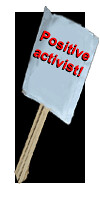
Another person had sourced the Family Policy Institute's guide to parties' values and that generated huge interest.
Then we began to remark at how interesting the interest in party policies and the appearance of these tools is. It really is encouraging. Instead of listening to the mud slinging that characterizes South African political debate, we can now evaluate parties based on their policy. Surely the voter curiosity and the creation of these tools marks a maturing of our democracy?

We remarked that what we were experiencing is perhaps due to the emergence of a potentially credible opposition in Cope, but most likely the sensation of Obama's campaign and election. A colleague remarked how she had listened to her 17 year old daughter discuss the elections with friends. She asked her daughter who she would vote for.
"Cope, mom," her daughter replied.
"Why?" she asked.
"Because Cope is hope," her daughter recited the party's enigmatic slogan. It sure echoes the Obama, "Yes we can!"
What was also evident is how much damage the DA's Stop Zuma campaign has done to the party's image. People are tired of "anti-" campaigning. Tell us what YOU stand for.
Someone remarked, "What does it matter? If you don't vote DA, your vote against the ANC is wasted."
No dammit! If the Cape Town results of our last local government election proved anything, it was the power of coalition politics. Non-ANC parties were forced to form a coalition to gain control of the Cape. It meant that those that agreed with the Independent Democrats' policies were granted huge power as the ID became the king-makers in their coalition choices. Their initial choice of siding with the ANC probably knocked the party back forever, but the point was proved. Even the third, forth or fifth most popular party can wield tremendous power in the swing vote in coalition formation. Lesson - vote your conscience.
Further history demonstrates this point. Most South Africans know of when Helen Suzman was the only representative of the Progressive Party in South Africa. She stood up against tireless abuse from the National Party and her voice echoed from the one seat her party held in parliament to the corners around the world. Tell me it was not worth voting for her.
On a far lighter note, the Nandos campaign has landed it in hot water with the ANC Youth League. But oh how brilliant:
I really hope you vote tomorrow if you're eligible. It should mean something that people died for the right to vote. Some friends won't vote for a variety of reasons:
- "Because all politicians lie"
- "Because the ANC will still win"
- "Because I don't identify with any of the parties"
Vote for the rational above. It only takes a few thousand votes to obtain one seat based on South Africa's proportional representation system. That means that even if only a couple of people in each town or city vote for your choice of party, together you could add up to a seat in parliament for your choice.

No comments:
Post a Comment